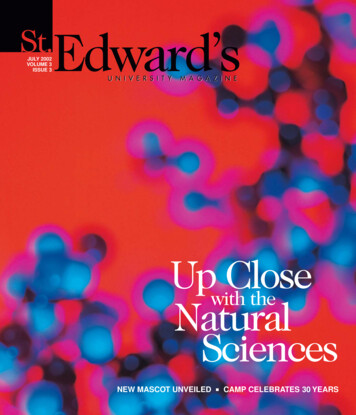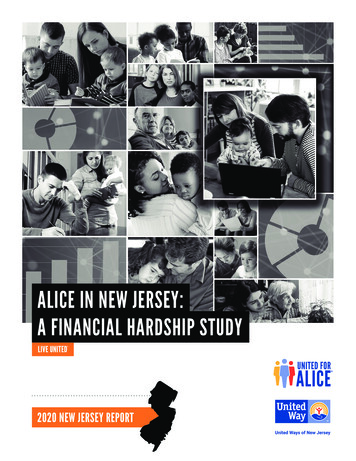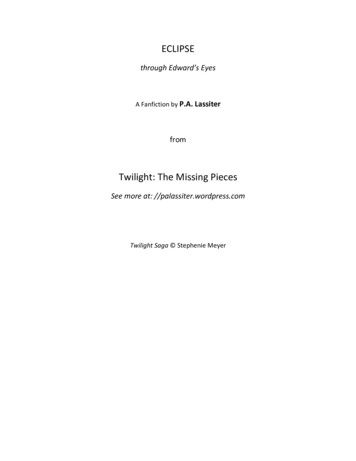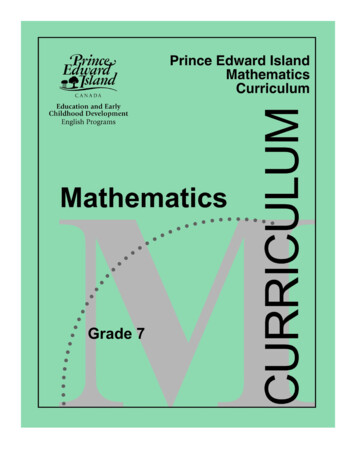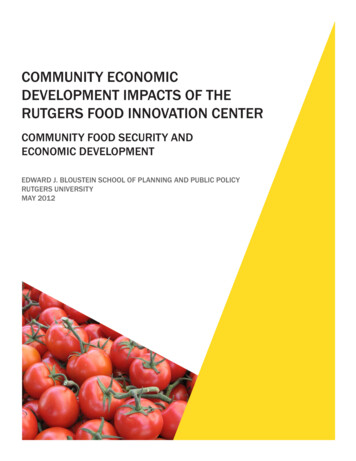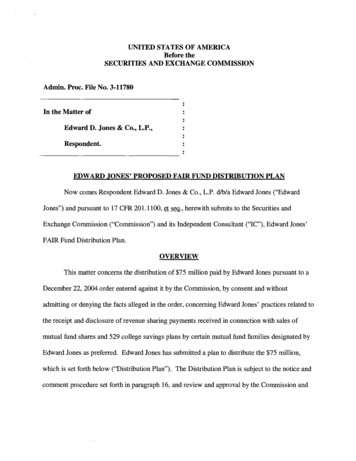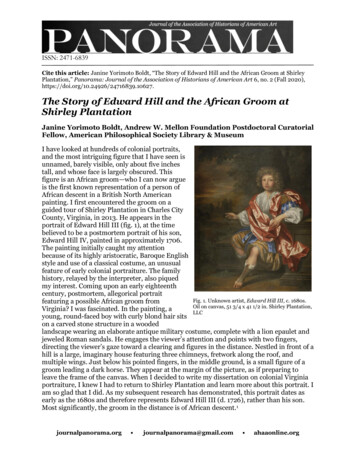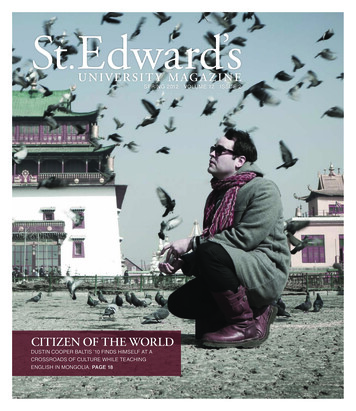
Transcription
Edward J. Bloustein Schoolof Planning and Public Policybloustein.rutgers.edu
World-class faculty. High-level professional and research staff. Dedicated support staff.Diverse and talented students. Active alumni.The Edward J. Bloustein School of Planning and Public Policy is continually striving toexpand our relevance in critical areas and meet the needs of the community at large. Wefoster a highly-collaborative academic, scholarly and professional environment, preparingstudents to be the planning, policy and health leaders of tomorrow, conducting cuttingedge, policy-relevant research and scholarship, cultivating leadership in public engagementand community service, and addressing the crucial policy issues of our time.Academic ProgramsThe disciplines and professions of urban planning, public policy, public health, healthadministration and public informatics are strongly situated in an educational contextthat stresses social science education and public service. The Bloustein School grantsB.A. and B.S. degrees in five majors, four Master’s degrees, and, through the RutgersSchool of Graduate Studies, a Ph.D. in Planning and Public Policy.ResearchFaculty, staff and students conduct research on critical issues facing the world, country,state, and neighborhoods. Researchers study climate change, poverty, inequality,housing finance, community development, transportation, health, immigration,education, urban design, statistics, and government funding and budgeting, expandingthe school’s public service mission and providing students with opportunities forresearch on some of the most critical planning and public policy issues.CommunityThe Bloustein School educates a highly select group of students and prepares them forcareers in the public, nonprofit and for-profit sectors, teaching and research professions,and service at all levels of government. Alumni of the school are employed in areasof planning, land use, politics, public and community health, employment and socialpolicy, human services, transportation, housing, urban policy and internationaldevelopment.Since 2000, the number of academic programs offered has doubled—the school offers five undergraduate majors,four master’s programs,and one doctoral program.
Degree ProgramsUndergraduate ProgramsThe Bloustein School offers bachelor degrees in five major fields and seven minorprograms. With an undergraduate population of approximately 800 students and growing,the Bloustein School is small enough to offer students individual academic support andthe focus of a professional school, but large enough for students to enjoy all the benefits,resources, and opportunities of a leading public research university.At the Bloustein School, we lead by exploring planning approaches and policy solutionsthat are healthy, green, and fair, pursuing equitable and efficient responses to publicproblems at multiple levels from the global to the local. The Bloustein ethic engages thosewho do their jobs not just honorably, but with a passion for their work.Majors Public HealthUrban Planning and DesignPublic PolicyHealth AdministrationPlanning and Public PolicyMinors Public HealthDegree program enrollment* has almostUrban Planning and Designtripled since 2000-01Public PolicyHealth AdministrationPlanning and Public PolicyPublic Administration and ManagementUrban StudiesThe Bloustein School’s overall budget grew by 16 millionbetween 2000-01 and 2017-18*Graduate and undergraduate students enrolledThe school’spublic healthprogram is one of thefirst stand-alonebaccalaureate programsto be accreditedby the Council onProgram,other incomeGiftsGrants/ContractsStateTuitionTuition is now the largest source of income for theschool, encompassing 45 percent of the school’s budget.Education for Public Health
Ph.D. in Planning and Public PolicyDesigned for students seeking careers in university teaching and research or inadvanced policy research in the public or private sectors.Public Policy Master’s ProgramsStudents prepare for careers in policy analysis, politics, and public affairs within thepublic, private, nonprofit, or private for-profit sectors. Master of Public Policy (two-year program) Master of Public Affairs and Politics (one-year program) Dual and joint degrees ino M.P.P./M.C.R.P.o M.P.P./M.P.H.o M.P.P./J.D.o M.P.P./M.S. in Global Affairso M.P.P./M.B.A.o M.P.P./M.S.W.Urban Planning Master’s ProgramsStudents develop a comprehensive understanding of cities and regions and thetheory and practice of planning using a variety of analytic methods while becomingsensitive to the ways in which planning affects individual and community values. Master of City and Regional Planning (two-year program) Master of City and Regional Studies (one-year program) Dual and joint degrees ino M.C.R.P./M.I.P. (infrastructure planning)o M.C.R.P./M.P.P.o M.C.R.P./M.S. in food and business economicso M.C.R.P./J.D.o M.C.R.P./M.B.A.Health Administration Master’s ProgramsThrough executive and traditional master’s degree programs, students receive aninterdisciplinary education focused on improving health care, health systems,and policy. Master of Health Administration (traditional, two-year program) Master of Health Administration (executive, cohort based, two-year program,weekends only)Since 2000, thenumber of studentstaking Bloustein Schoolcourses* has increasedby over 400%Public Informatics Master’s ProgramThe program provides the vehicle for educating students in the competencies neededin the field of big data: context, statistics, programming, data management, dataanalytics, visualization, spatial analysis, applications and the integration of these skills.This interdisciplinary program uses scientific methods, processes, algorithms, andsystems to extract knowledge and insights from data in various forms, cross-trainedprofessionals with skills in public applications of information science are needed.*Courses open to students across RutgersUniversityAccreditations and Rankings—Graduate Programs
The John J. Heldrich Center for Workforce Development (HCWD) isdedicated to addressing the core challenges of New Jersey’s and thenation’s workforce. For example, HCWD provides research and supportto New Jersey Departments of Education and Labor, New Jersey Officeof the Secretary of Higher Education, U.S. Departments of Education andLabor on the New Jersey Education to Earnings Data Systems, and leadsTransforming U.S. Workforce Development Policies and Investing inAmerica’s Workforce, The Federal Reserve Bank System.The Planning Healthy Communities Initiative (PHCI) promotes theconsideration of public health impacts into decisions about projectsand policies. Examples of projects are Opportunities for Health ImpactAssessment, Health Impact Project, a collaboration of the Robert WoodJohnson Foundation and the Pew Charitable Trusts, and Lifelong Elizabeth:Age-Friendly Community Planning, Grotta Foundation.Centers of ExcellenceThe Bloustein School has a number of research centers and initiatives thatcarry out economic, social, environmental and health research, outreach,service, community engagement, and training.The Bloustein Center for Survey Research (BCSR) provides high-qualitydata collection and research methodology consultation services for socialand economic project areas. Examples of recent projects are the New JerseySubstance Abuse Monitoring System, New Jersey Department of HumanServices, and the New Jersey Birth Defects/Autism project, New JerseyDepartment of Health.The Bloustein Center for Local Government Research (BCLGR) providesresearch useful to New Jersey’s elected and appointed officials, facultyand researchers, policy analysts and practitioners. One recent exampleis the Comprehensive Accountability Report of the Transition Plan for theReturn of Local Control to Newark Public Schools, New Jersey Department ofEducation and Newark Board of Education.The Center for Energy, Economic & Environmental Policy (CEEEP)conducts applied research to evaluate and help develop energy policyat the state, regional, national, and international levels. Examples areDeveloping the State of New Jersey Offshore Wind Strategic Plan, Ramboll andNew Jersey Board of Public Utilities, and Collaborative Research ModelingStrategic Regulators in Network Infrastructure, National Science Foundation.The Center for Negotiation and Conflict Resolution (CNCR) is atthe forefront of a movement that believes disputes can be settled byconstructive negotiation and consensus-building and problem-solvingapproaches instead of by force or adversarial argument. CNCR providestraining, workshops, and seminars for those interested in negotiation andthe theory and practice of conflict resolution.The Environmental Analysis and Communications Group (EAC)advances strategies to build communities that are healthier, greener,equitable, resilient and more prosperous. Examples of recent projectsinclude Survey of Organizations Engaged in Delaware River WatershedConservation, National Fish and Wildlife Foundation and Coastal ZoneManagement Project, New Jersey Department of Environmental Protection.The HIV Prevention Community Planning Support and DevelopmentInitiative (CPSDI) is a joint program of the NJ Department of Health andSenior Services, Division of HIV/AIDS Services (NJDHSS, DHAS) and theBloustein School. CPSDI runs the NJ HIV Prevention Community PlanningGroup and provides training courses in HIV Prevention Counseling,Capacity Building, and Effective Behavioral Interventions for the NewJersey Department of Health.The Rutgers Center for Green Building (RCGB) promotes green buildingthrough research, advocacy and education. Examples of projects arethe New Jersey Green Building Manual for the New Jersey Departmentof Community Affairs, and Community Solar Pilot Program, New JerseyBoard of Public Utilities.The Rutgers Economic Advisory Service (R/ECON ) provides privatesector and government leaders with a comprehensive set of tools foranalyzing the New Jersey economy. Recent work includes Review ofGrow New Jersey and Economic Redevelopment and Growth Programs, NewJersey Economic Development Authority, and Review of the PinelandsCommission’s Long-term Economic Monitoring Program, New JerseyPinelands Commission.The Alan M. Voorhees Transportation Center (VTC) is the nucleus oftransportation training and education, policy, and research at RutgersUniversity, and includes the National Transit Institute, which wascreated by Congress in 1992. Other ongoing projects include the NJBicycle and Pedestrian Resource Center for the New Jersey Departmentof Transportation, and Together North Jersey Regional Cooperation forSustainable Development, U.S. Department of Housing and UrbanDevelopment and New Jersey Transportation Planning Authority.The Ralph W. Voorhees Center for Civic Engagement (VCCE) is acollaborative effort towards community development, food security,and housing issues in some of New Jersey’s largest cities. Examplesinclude Working Together for a Food Secure New Brunswick, New BrunswickCommunity Food Alliance (NBCFA), Johnson & Johnson, and RutgersUniversity and the Federally Assisted Housing in Greater Newark, GreaterNewark Federally Assisted Housing Coalition.
The Bloustein School has long been a leader in the fieldsof planning and public policy. The wealth of resourcesat Rutgers University has enabled us to build strongpartnerships with the private sector, public agencieson federal, state and local levels, elected officials, and a vastnetwork of Bloustein alumni throughout the world.The convergence of our disciplines—planning,policy, public health, and more recentlyhealth administration and informatics—provides our students the opportunity to understand theimportant role of planning, policy-making, analytics, andcommunity design in livability and health and wellbeing.Piyushimita [Vonu] Thakuriah, Ph.D.DEAN AND DISTINGUISHED PROFESSORThe school’s stellar faculty and dedicated research associates and staff have led the way incollaborative efforts resulting in cutting-edge research initiatives.33 Livingston Avenue New Brunswick, NJ 08901-1981 p: 848-932-5475 f: 732-932-1771bloustein.rutgers.eduLike us on Facebook @blousteinFollow us on Twitter @blousteinschoolFollow us on Instagram @blousteinschoolRutgers, The State University of New Jersey, does not discriminate on the basis of race, color, national origin, sex, sexual orientation, gender identity or expression,disability, age, or any other category covered by law in its admission, programs, activities, or employment matters. The following people have been designated to handleinquiries regarding the nondiscrimination policies: Judy Ryan, Universitywide Title IX Coordinator, Office of Enterprise Risk Management, Ethics, and Compliance (732-2355304, judy.ryan@rutgers.edu) or Lisa Grosskreutz, Director, Office of Employment Equity, University Human Resources (848-932-3980, or by email). For further informationon the notice of nondiscrimination, you may contact the U.S. Department of Education, Office for Civil Rights, at 646-428-3900 or OCR.NewYork@ed.gov. 7/2019 Rutgers, The State University of New Jersey. All rights reserved.
that stresses social science education and public service. The Bloustein School grants B.A. and B.S. degrees in five majors, four Master's degrees, and, through the Rutgers School of Graduate Studies, a Ph.D. in Planning and Public Policy. Research Faculty, staff and students conduct research on critical issues facing the world, country,

